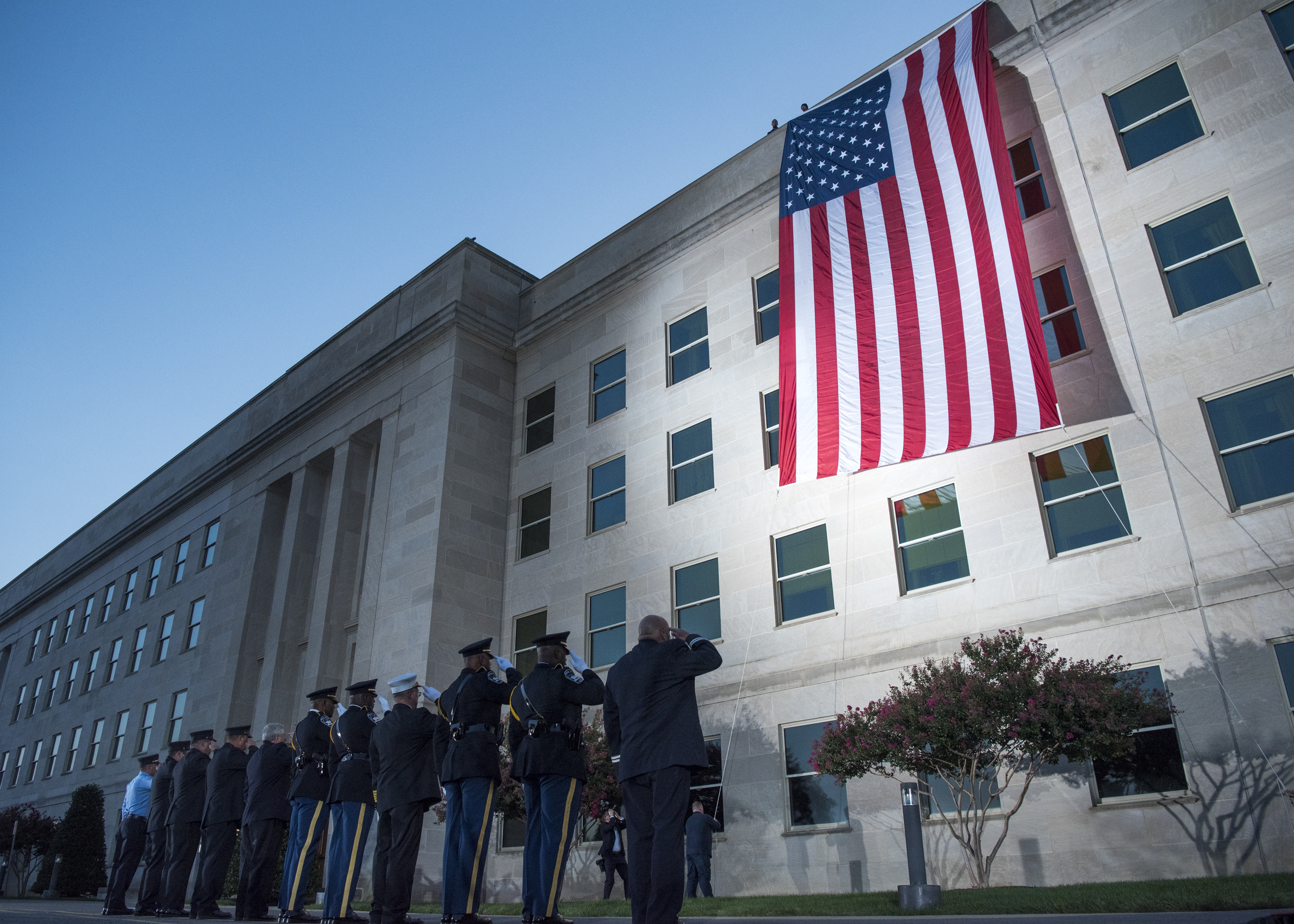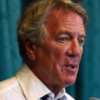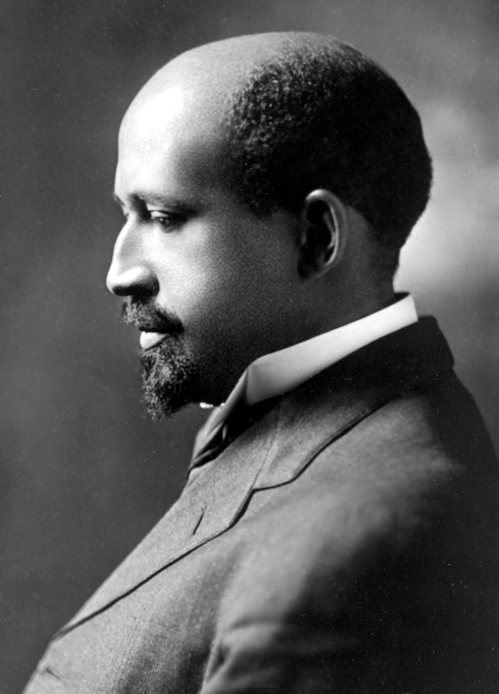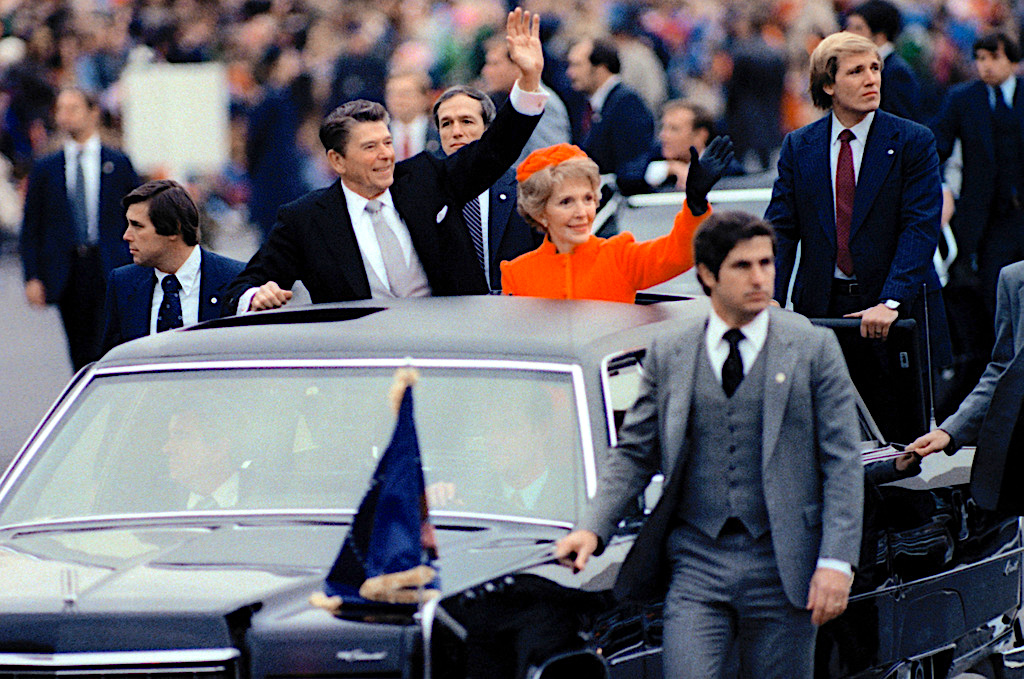Considering the common U.S. reaction to 9/11, we must ask: Can the U.S. do without its exceptionalist consciousness? Or is this consciousness indispensable to America?

9/11 dawn memorial at Pentagon, Sept. 11, 2017. (Dominique A. Pineiro/DoD)
By Patrick Lawrence
Original to ScheerPost
Mut zur Ethik is a forum associated with a publishing cooperative that holds conferences twice a year in the environs of Zurich. On Sept. 1–3 the group celebrated 30 years of conferences, the theme this year being “A multipolar world order takes shape.” The following is a transcription of the speech I was invited to give.
There is no graceful translation of mut zur ethik: It means literally “courage for ethics,” so let us bring it into English as, roughly, “ethical courage,” or, to stretch the point, “moral courage.” The group publishes its journal in three languages. Current Concerns, Zeit Fragen and Horizons et débats are available online; the German and French editions are also available in broadsheet print formats.
This is an edited version of my remarks last week.
 Let me begin with an observation that I think is obvious even if it is rarely noted. It is this: There is no separating politics and psychology. This seems to me an especially useful truth as we explore our topic this evening, and I go to Erich Fromm and Carl Jung to explain it. People, individuals, make societies, but societies, just as truly, make individuals.
Let me begin with an observation that I think is obvious even if it is rarely noted. It is this: There is no separating politics and psychology. This seems to me an especially useful truth as we explore our topic this evening, and I go to Erich Fromm and Carl Jung to explain it. People, individuals, make societies, but societies, just as truly, make individuals.
This evening I will look to the latter side of this matter more than the former. Americans have made America, true enough, but I am more interested for now in how America has made Americans — how it has shaped the psychology that defines Americans — the consciousness that marks them out, indeed, so distinctly from others.
Being an American and seeing things from the inside out, so to say, I have thought for a very long time, and certainly since the events of Sept. 11, 2001, that my country’s conduct and altogether its direction, which I would say has been consistently downward these past two and some decades, is to be understood primarily as a case of collective psychology — social psychology might be the best term here.
There are many events to be considered, but it is the underlying psychology that drives Americans in these events, and I urge that we look to this so as to understand them. Since 2001 we have been a wounded, uncertain people. This psychological state simply cannot be left out of any consideration of American policies and politics so far in this century.
So I come to our topic this evening, and it extends vastly beyond the consequences of the 2001 attacks in New York and Washington. What America has been the whole of its existence, what the United States has been even before it was called the United States, has got to be understood first in terms of its psychology. I am talking now about the shared presumption we commonly call American exceptionalism.
Less a Nation Than an Ideology
Richard Hofstadter, a noted and very fine historian during the postwar decades, once observed that America was less a nation than an ideology. It goes directly to my point. What has given America its distinct character for four centuries now has been what I call its exceptionalist consciousness, although we can do just as well following Hofstadter and call exceptionalism America’s ideology.
Little that America has done, from the earliest settlements and the Quaker hangings in the late 17th century to its 19th century wars, expansions and annexations, to its anti–Communist crusades in the last century, to Vietnam, and all the coups and interventions in the post–1945 decades: To grasp all of this fully we must see the underlying, driving psychology.
I do not say this— and I must emphasize this point strongly — to discount the importance and force of politics and history, as one must never do. I say it because all of these events, disparate as they are as historical phenomena, arise from the same consciousness: They are all part of the same root phenomenon.
And all of this goes, it hardly bears mentioning, for all that we witness now: The cruelly inhumane proxy war in Ukraine, the dangerously provocative encirclement of China, America’s unruly conduct in the Middle East, in Latin America — America’s claim to exceptionalism lies behind all of this.
So we must remember our starting point: There are the politics of these events and there is the underlying psychology these events reflect.
Before & After 9/11
If there is a difference between our time and times previous on this question, I think it lies in this: Let’s talk in terms of pre–2001 time and post–2001 time.
Since 2001 Americans have nursed a profound doubt, a subliminal, never-spoken-of suspicion that they actually have no claim to exceptionalism. This is something new in the American story.
As I have mentioned among you previously, those two attacks on American soil brought Americans face-to-face with the realities that they are as vulnerable to the might of others as anyone else, that they are not as previously assumed immune from the force of history, that they are as defenseless as anyone else against the ravages of time.

President George W. Bush takes notes as he listens to news coverage of the World Trade Center terrorist attacks Tuesday, Sept. 11, 2001, during a visit to Emma E. Booker Elementary School in Sarasota, Florida. (U.S. National Archives, Flickr)
These doubts are unprecedented in American history and run very deep. They have their roots in the Vietnam era, and I will come to this shortly. For now I must quickly add that the effects of these doubts have not been as one might expect. Americans have not said to themselves since 2001, “We must think again.
We must find a new idea of ourselves and our place in the world, a new idea of what we are supposed to do.” No, Americans have done just the opposite: They have attempted to deny their doubts, to suffocate them as if under a pillow, by becoming more shrill and insistent in proclaiming their exceptionalism — and ever-bolder in their assertions of it in their conduct abroad.
The result is the dreadful mess we see when we look out our windows. One event at a time, we have been living through an ever-increasing global disorder, the source of which is none other than the nation that proclaims itself at every turn the advocate of what it calls “the rules-based order.” I do not read confidence in this conduct so much as I read insecurity.
Considering the common American reaction to the 2001 tragedies, we are required to ask a very large question. Can America do without its exceptionalist consciousness? Or is this consciousness what is in fact indispensable to America? In other words, can there be an America without its idea of its exceptional status, or if we subtract it will America no longer cohere, no longer know itself, and so no longer be America?
If Hofstadter had it right when he said America is an ideology more than it is a nation, what happens when that ideology fails the people who invest in it?
It is a little unnerving to ask such questions, as I have an idea the answer could turn out to be the depressing one: No more exceptionalism, no more America in one or another fashion. But with this question in mind I would like to explore the matter of American exceptionalism with you this evening.
And then I propose to leap ahead of myself and my pessimistic view to consider briefly what an America without its exceptionalism, a post-exceptionalist America, this is to say, might be like on the assumption such an entity may be at all possible.
We commonly locate the origins of America’s self-image in the earliest settlers coming across the Atlantic from England. It was John Winthrop, in his famous 1630 sermon, who gave us our “City on a Hill” and who proclaimed “the eyes of all people are upon us.”
But we have to look to the 18th and 19th centuries, as America made itself a nation, to grasp the exceptionalist notion in full. And immediately we find a confusion of meanings. To some, exceptionalism referred to the new nation’s revolutionary history, its institutions and its democratic ideals. But in the nation’s early years, it was also counted exceptional simply for its abundant land and resources, with no ideational aspect to the idea.

Mist from the Lower Falls as it drifts into the Grand Canyon of Yellowstone National Park. (GPA Photo Archive, Flickr, Public domain)
Alexis de Tocqueville is often credited as the first to describe Americans as exceptional. But he was talking about, and I’ll quote here, “their strictly Puritanical origin, their exclusively commercial habits, the fixedness of their minds upon purely practical objects.”
So it is a long journey from de Tocqueville’s time to ours, exceptionalism having gone from simple material observation to thought to article of faith, ideological imperative, a presumption of eternal success and a claim to stand above the law that governs all other nations.
Here I will share a few historical curiosities on our way to understanding American exceptionalism as we have it today.
It was none other than Joseph Stalin who brought the term “American exceptionalism” into common use. This was in the late–1920s, when a faction of the American Communist Party advised Moscow that America’s abundance and the absence of clearly drawn class distinctions made it immune to the contradictions Marx saw in capitalism.
Stalin was incensed: How dare those Americans stray from the orthodoxy by declaring their nation an exception to it? But amid the Soviet leader’s indignation, many American intellectuals considered his coinage an inspired summation of America’s history to date.
Democracy at Home, Empire Abroad

W.E.B. Du Bois, circa 1911. (Addison N. Scurlock, Wikimedia Commons)
At the same time, W.E.B. Du Bois, the celebrated black historian and intellectual, emerged among the first prominent critics of the notion that America and its people were in any way singular or in any way not subject to the turning of history’s wheel. His biographer called him one of “exceptionalism’s exceptions.”
Du Bois found the source of our modern idea of exceptionalism in the post-bellum decades leading up to the Spanish–American War, 1865 to 1898. He asserted that two visions of America emerged during that 30-odd year period. In one, America would at last achieve the democracy expressed in its founding ideals. The other pictured an advanced industrial nation whose distinctions were its wealth and potency. Democracy at home, empire abroad: When combined, these two versions of America’s destiny were to be something new under the sun, and this amalgam would make America history’s truly great exception.
This was never more than an impossible dream. There is never any combining empire and democracy, as we Americans now discover rather painfully. Du Bois considered the thought of the two together “the cant of exceptionalism,” in his biographer’s phrase, intended primarily to deflect the bitter realities of the Gilded Age and then the Great Depression.
In 1941, six years after Du Bois published these thoughts, Henry Luce declared the 20th “the American century” in a now-famous LIFE magazine editorial. Now we are getting to American exceptionalism as we have it today. America was, I will quote here, “the most powerful and vital nation in the world,” the celebrated publisher crowed. It is “our duty and our opportunity to exert upon the world the full impact of our influence, for such purposes as we see fit and by such means as we see fit.”
Luce, without using the phrase, had neatly defined American exceptionalism in its 20th century version. And from his day to ours, that aspect of it we can consider religious or ideological has grown only more evident among many of its apostles.
The American defeat in Vietnam in 1975 marks the moment when the character of American exceptionalism changed fundamentally. To put a complex matter simply, professions of American exceptionalism had theretofore been expressions of confidence, often obnoxious as in the case of Luce. After the rise of Saigon, as I like to put it, self-doubt began to supplant the old self-confidence. It was as if the floorboards were trembling beneath Americans’ feet, and the idea of exceptionalism took on another complexion.

April 29, 1975: U.S.Marine guarding helicopters landing in Saigon during the evacuation of American civilians and “at-risk” Vietnamese. (Dirck Halstead, Wikipedia Commons, Public domain)
Ronald Reagan understood this. He had a very keen sense of the collective psychology. He understood that the injury would have to be salved if America was to carry on defending and extending its empire. If American exceptionalism had not previously been something between an ideology and a faith, or, I would say, a combination of both, Reagan set about making it one.
So did he breathe extraordinary new life into the old credenda—notably in his famous references to Winthrop’s “City on a Hill.” He quoted the phrase many times, always incorrectly, from the eve of his victory over Jimmy Carter in 1980 to his farewell address nine years later.
I recall those years vividly. I detected a desperate insistence in the exaggerated, flag-waving patriotism that overcame Americans during the first decade after the defeat in Southeast Asia. To me this turn in national sentiment demonstrated precisely what it was intended to refute: America was suddenly a nervous, uncertain nation.
It is difficult to overstate the importance of what Reagan did to counter this by way of all his images and poses.
He did not restore America’s confidence in itself after Vietnam. In my estimation, no American leader from Reagan’s day to ours has accomplished this. Reagan’s feat was to persuade an entire nation, or most of it, that it was all right to pretend: All was affect and imagery. He licensed Americans to avoid facing the truth of defeat and failure and of professed principle betrayed. He demonstrated in his words and demeanor that greatness could be acted out even after it was lost as spectacularly as it had been in Indochina.
The Rise of Denial

Reagan and his wife Nancy at his inauguration. (Public domain/Picryl)
This is the exceptionalism whose many destructive consequences we now witness. It is an ideology whose most peculiar feature is that it is subliminally understood to be exhausted and that it rests in large measure on denial. No American political figure would dare now to speak sensibly against the exceptionalist orthodoxy. This is ever more the case as the orthodoxy becomes more obviously hollow, more detached from perfectly discernible realities.
The only alternative case here is Donald Trump. He is the first president in our modern history simply to shrug off the notion and survive the judgment. “I don’t like the term,” Trump said at a Texas campaign rally in 2015. “I don’t think it’s a very nice term. ‘We’re exceptional, you’re not.’” Whatever else one may think of him, Trump is to be credited on this point.
Trump’s remark prompted a curious reaction among the liberal elites now in power. Jake Sullivan, a prominent adviser in the Obama administration and now President Joe Biden’s national security adviser, published an essay in 2019 that stands as indeed exceptional, if only for its ignorance.
“This,” meaning Trump’s remark and a general decline in public faith in the creed, “calls for rescuing the idea of American exceptionalism,” Sullivan wrote, “from both its chest-thumping proponents and its cynical critics, and renewing it for the present time.” He then unfurled, and I quote, “a case for a new American exceptionalism as the answer to Donald Trump’s ‘America First’ — and as the basis for American leadership in the twenty-first century.”
I find this thought stunningly ill-considered. Exceptionalism is not an idea or the basis of a policy: It is a belief, and this cannot be resuscitated by way of rational thought no matter how acute the thinking. What I read in Sullivan’s assertions is little more than cynicism of the same kind we saw in Reagan. They both proposed to manipulate ideological belief as a means of controlling public opinion to revive domestic support for the conduct of the imperium abroad.
This is what exceptionalism has come to: It is nothing more than an instrument to be deployed as part of the larger propaganda apparatus. This is not to say it can be in any way dismissed. As I suggested earlier, exceptionalism when manipulated in these conditions — conditions of uncertainty and national self-doubt — is more dangerous and destructive than it would be otherwise for the simple reason the attendant desperation of the nation’s leaders removes all limits on acceptable conduct.

Sullivan, center, with NATO Deputy Secretary General Mircea Geoana, left, and NATO Secretary General Jens Stoltenberg, Oct. 7, 2021. (NATO)
I will assume we are all capable of making lists of the many appalling cases of American misconduct, taking whatever starting point one may choose. Here I want to turn briefly to another consequence of my country’s exceptionalist consciousness.
Hannah Arendt published an essay in 1953 titled “Ideology and Terror,” and it bears upon our concerns this evening. Ideologies, she wrote, “explain everything and every occurrence by deducing from it a single premise.” She then picks apart the etymology of the term: “An ideology is quite literally what its name indicates: It is the logic of an idea.” She later explains that she means the internal logic of an idea that may not be at all logical outside of its own self-reference.
Arendt goes on to note the various effects of ideologies on their adherents. One of these is they replace thought with belief, so obviating the need for ideological believers to indulge in the act of thinking—to respond with rational judgment to events and circumstances. Another is the effect of isolation. Ideologies are in one dimension boundaries, and one stands on either side of these.
Those inside these boundaries share a bond made of allegiances of which no one else can partake. Those outside these boundaries are simply excluded: They are Others. The implied separation is sometimes much more than psychological, but it is psychological before it is anything else.
I suppose in the middle we have to allow for “fellow travelers,” as the old expression goes: Those who do not share the ideology but stand with those who do. And here I must be bluntly honest in saying I think of Europeans in this way. Setting this aside, it is easy to see what ideologues share with members of pre-modern tribes. In both cases there is the inside and the outside.
Donate to CN’s Fall Fund Drive
I mention Arendt’s long essay and these few points in it to explain one of the more enduring consequences of the exceptionalist ideology for Americans. No one much talks or writes about it, but we have made ourselves a profoundly isolated people, a lonely people. This is perfectly evident on the ground, so to say, when we consider the extent to which America’s foreign policies now raise objections around the world. A large majority of nations and most of the global population object to Washington’s proxy war in Ukraine, to take a ready example.
Trapped in a Fantasy

Kissing the war goodbye, Times Square, New York City, Aug. 14, 1945. (Victor Jorgensen, U.S. Archives, Wikimedia Commons, Public domain)
But I have used the word “lonely” with intent. Americans are also isolated from others psychologically, and I would say this is also in direct consequence of their claim to be exceptional. Like all ideologues, and here I will make a generality I am prepared to defend, Americans, by and large, would much rather believe than think.
This in itself tends to leave Americans isolated, because he who believes but cannot think is incapable of relating to the world with what Fromm calls “spontaneity.” He is instead in the way of an automaton, and I take this term from Fromm, too. Anyone who has met an American of this kind, and it is not hard to do so, knows well that it is difficult to communicate with people who prefer belief to thought.
Our exceptionalism also serves as a confinement: We trap ourselves within a fantasy of eternal superiority and triumph. So we cannot hope to speak the same language as the rest of the world, and we don’t. We do not see events the same way. We do not react to events in the same way. We do not calculate the same paths forward.
In short, we neither understand nor are understood. This is what I mean when I say Americans are a lonely people. Luigi Barzini, the Italian journalist who was a careful student of the United States, published a book in 1953, the same year Arendt wrote her essay, called Americans Are Alone in the World. Barzini’s reference was to the singular responsibility that fell to Americans in consequence of the 1945 victories.
But I read a certain prescience into Barzini’s book. He saw ahead of his time that Americans were destined — because of the position we suddenly occupied and the way we occupied it — to be off by ourselves in the postwar world — isolated and, as I say, lonely.
My point here is that if America’s claim to exceptionalism imposes burdens on the rest of the world, it imposes burdens on Americans, too.
This brings me to the question I posed at the outset: Can America live without its claim to exceptionalism? What kind of nation would it be in such a case? Can we speak of a “post-exceptionalist America,” in other words? I do not think it is too soon to consider these questions, although I allow for those who can see no chance of such an eventuality.
Let me spend a few concluding moments explaining my views in this connection. In keeping with all I have said so far, any transformation into a post-exceptionalist America would have to begin with ordinary Americans — a critical mass, let us say — opening themselves to a break with history and so to the idea of another kind of nation.
Our political thinkers, scholars and policy planners —altogether our intellectual class — must similarly open themselves. I am saying here only what I said at the outset: If societies make individuals, the inverse is also true. Exceptionalism, while it invokes the providential hand — “the Great Œconomist,” as they used to say in the 18th century —it is as much a manmade ideology as any other. What we have made we can unmake.
How given are Americans to this leap forward? Despite appearances from a distance, I think a good many Americans appear eager, if not desperate, for a transformation of this kind. For these many, it is a question not of repudiating national aspirations but of abandoning the mistaken course they have set us upon.
To return to Du Bois’ thesis, this constituency now comes to understand that the exceptionalist notion of a virtuous empire and a thriving domestic polity has proven a disastrous delusion. Dominance abroad, in other words, must give way to democracy at home. Our political scene suggests very strongly that there is a mounting desire to accomplish this shift in national priorities.
America is now a house divided, if this is not evident even from an ocean away. What we need are leaders capable of bringing the nation along in a new direction. At present, there is much to suggest that seven decades of preeminence have left too many of our leaders incapable of anything that might pass as a reconstituted vision of the nation’s future. They persist, instead, in the long-bankrupted pursuit of democracy and empire — the old, impossible dream.
We do not, in short have the leadership we need. But I do not think we are too far from seeing the kind of leaders we need appear. The time this will require will prove agonizing, but we also find among us an incipient generation of leaders who stand squarely against our condition of inertia. Tulsi Gabbard, the vigorously anti-imperialist former congresswoman from Hawaii, is but one example of this emergent cohort.
One may not care for Donald Trump or for Robert F. Kennedy, Jr., but that is not my concern here. Whatever one thinks of them, they are trying to speak in a new political language — the post-exceptionalist language all American must learn. The common theme is plain: To remake American democracy and to abandon imperial ambitions are two halves of the same project.
This is where we are now with regard to our exceptionalism, it seems to me. It is difficult to argue that we as a society are prepared for this moment. But it is nonetheless time — if, indeed, we are not already late — to make our leap into a post-exceptionalist awareness of ourselves and ourselves among others. It is time to leave something large and defining behind, to put the point another way.
There are sound reasons to assign our moment this magnitude of importance. Abroad, the world tells us nearly in unison that the place the old American faith found in the 20th century is not open to us in the 21st. The near-chaos we are responsible for since the events of Sept. 11, 2001 —notably but not only in Afghanistan, Iraq, Libya and Syria — is of an order the community of nations comes to find unacceptable.
I have argued for many years that parity between West and non–West is a 21st century imperative, as is the emergence of a multipolar world order. At the moment, American leaders are in denial of these realities. This can go on a very long time, being realistic, but it cannot go on forever: Sooner or later our purported leaders will have to accept these things.
At home the intellectual confinements exceptionalist beliefs impose have debilitated us for decades. We are now greatly in need of genuinely new thinking in any number of political and social spheres even as we deny ourselves permission to do any such thinking.
And here I come to the essential motivation for Americans to make the leap into the future I urge, the sine qua non of it: It must first dawn on us that it is greatly, immeasurably to our advantage to embrace a post-exceptionalist idea of ourselves. This truth has not yet come to us; no leader has said this to us. How little do most of us understand, in consequence, that to abandon our claims to exceptional status will first of all come as an immense unburdening?
Some years ago, Bernd Ulrich, the noted German commentator, asked the most excellent question from my point of view. “Can America save itself?” Ulrich wondered in Die Zeit. It is precisely my question as I look toward a post-exceptionalist idea of America. This idea, indeed, was Ulrich’s unstated topic.
“In principle, absolutely,” he replied to his own question. “But certainly not with gradual changes,” he then wrote, and I resume the quotation: “In terms of global politics and history, it must get off the high horse it has so long ridden. It needs a moderate self-esteem, beyond superlatives and supremacy.”
I will leave the matter here this evening, but as I do I will share two concerns I have as I think about this large transformation. One, given the velocity with which America now ravages destructively around the world, will there be enough time to accomplish such a project before it is too late, too much damage done? Two, will others have enough patience to wait should we Americans determine to make such a transformation?
I wish I was not so uncertain of these things as I am. And it would be good to hear from you about these two worries of mine if you are inclined to share your thoughts.
Patrick Lawrence, a correspondent abroad for many years, chiefly for the International Herald Tribune, is a columnist, essayist, lecturer and author, most recently of Journalists and Their Shadows. Other books include Time No Longer: Americans After the American Century. His Twitter account, @thefloutist, has been permanently censored. His web site is Patrick Lawrence. Support his work via his Patreon site. His web site is Patrick Lawrence. Support his work via his Patreon site. His new book, Journalists and Their Shadows, is available from Clarity Press or via Amazon or Google Books.
This article is from ScheerPost.
The views expressed are solely those of the author and may or may not reflect those of Consortium News.
Donate to CN’s
Fall Fund Drive



Can someone explain to me the difference between (American) Exceptionalism and Delusions of Grandeur?
Huh? Please?
The present status quo has to be convinced “the transformation” is an immediate existential essential; not an option.
We are witnessing the demise of an empire and we can readily see the fate of former empires when we look at Britain today. NATO has a full complement of former empires now defunct.
History makes no exceptions for those claiming to be exceptional, like everything else empires start to die at their moment birth.
Brilliant speech from a great writer !
Sometime during Obama’s administration I wrote to my siblings that: “The only leader that could save America now is the one that would tell us that it is over. Being the world’s policeman, being the “shining city on the hill,” being the world’s last best hope. But what political leader would commit such political suicidal?”
It occurs to me America already had such a leader, and it seems he came to realize that he had committed actual suicide. His name was Martin Luther King. Though motivated by faith in the goodness of man, he knew that all things are eventually political because politics is just a name for what we do collectively, no matter what forms it takes.
Imo, American “Exceptionalism & Its Consequences,” ‘My country isn’t free. A sweet land of misery. To thee, I sing, “The home of the brave and the land of the free, is a f/war zone!!!”
“Can America save itself?” Fuhgeddabout it!!!
IMO, “We’re” still looking for a “LEADER.” Coming soon, ELECTION 2024. It’s clear as a bell, the war mongering Political Corpse, posing as POTUS masquerading as human IS manufacturing hate, war and fascism; AND, masquerading fascism as “democracy.”
“For gawd’s sake! This man & woman CANNOT remain in power!!!” POTUS will deliver us to “the gates of hell,” he was @ on 9.12.01.
Plus, POTUS’ Build Back Better, re$toring America’s soul, is NOT being built w/BRICS. The USD, Dives. Other currencies Ri$e. The 21st Century is a MultiPolar World. Unipolarity like War must be eliminated. POTUS is “old $chool.” Plus dementia addled, truth challenged, perverted; but, even in that f.u.b.a.r., condition, POTUS’ got the opportunity to turn this $hituation around.
One Giant Step to Peace, The Divided $tates of Corporate America become a signatory to “Save The Planet!!!” Eliminating the Dept. Of Homeland $ecurity and creating a Department of Peace, i.e., “Tricontinental: Institute for Social Research” the nucleus, the model. The beginning to world w/o America’s wars, RBO’s, RBIO’s, MIC, C.I.A., F.B.I., when Julian Assange “lives free…..” Thirteen years later, Julian Assange is locked up, 24/7, on trumped-up charges!!! “Patience?!?” If, it takes for f/ever……
TY, Patrick Lawrence, CN. Onward & Upwards!!! “Keep It Lit.” Ciao.
Assuming, of course, America has a conscience.
I have for some time been bothered by the song “God Bless America”, which to me embodies the spirit of American exceptionalism, particularly in the way the song invokes the name of God.
The song seems to me to be telling God what to do. The song seems to be telling God that our nation of America is so great and wonderful and exceptional that God has no choice but to bless our nation.
If God, in the commonly understood sense of the word, is really real and worthy of the name then God is concerned about all of humanity and is not at all concerned about or interested in blessing any one particular tribe or nation over other tribes or nations. (This includes both America and Israel. Note: I consider myself to be a Deist. I do not believe the Bible or any other alleged revelation from God to actually be such. And I reject any idea that God has especially chosen the Jews or Israel over other people or nations.)
Just knowing about all the atrocities and evils that America has been responsible for, it seems presumptuous and offensive to tell God to bless our nation.
And I will also say that as a patriotic song the song is very disrespectful of patriotic Americans, Americans who love their country, who are atheists, who do not believe in God, or who are of a particular religion that does not worship the Judeo-Christian God. A key founding American principle is that of religious freedom, the absolute right of a person to believe or not believe, to worship or not worship, as that person chooses. It is no part of the patriotic duty of any American to give any acknowledgement to either the Judeo-Christian God or any other deity.
If I am in a setting where they are singing “God Bless America” I make a point of not joining in the singing and not applauding at the end of the song.
Right on!
The irony of the American belief in exceptionalism is that so many of those things deemed to be exceptional are not.
For example – the absence of clearly drawn class distinctions, applies also to Canada and Australia and more so. The US has always been deeply divided between rich and poor and still is, even more so. Class distinctions have always created racial or ethnic ghettoes in ways not seen in Australia or Canada.
And even in terms of natural wealth the US is not and was not exceptional – Russia is vastly bigger and extremely rich in natural wealth.
The almost cult like American belief in their own specialness has only worked for a time but now, like the Emperor with no clothes, has finally been realised as fantasy and dangerous fantasy at that.
Exceptionalism is one of the typical excuses used by despots and tyrants throughout history to justify their actions. It also covers up any number of issues a person or country might have about who or what it really is – the underlying fears, complexes, phobias, that lead to feeling that it might not be ‘good enough’ in some way.
Rather like the proverbial chip on the shoulder mentality, resulting in attitudes and behaviour intended to deceive oneself and all observers, and cover up the ghastly truth.
Exceptionalism is inherent, in some ways, to every ego, every social group, every culture. Therefore difficult to challenge frontally. Perhaps this best be addressed through the idea of maturing, becoming exceptional and responsible stewards…. being part of the solution… more godlike.
By expecting our public broadcasters to advance understanding, a functioning fourth estate could evolve. One that respected a “fairness doctrine”.
Read Albert Nolan’s Jesus Before Christianity to understand the teachings of someone who had no truck with the notion of superiority.
I’m very appreciative of Lawrence’s approach to our psychological/political position in the U.S.
Our nation would demonstrate it was truly exceptional if it were the first hegemonic nation to peacefully renounce its hegemony, and finally join the family of nations as one among many. Thanks to Patrick for another exceptionally thoughtful essay.
Exceptionalism is synonymous with patriotism, which is used far more to justify U.S. imperialism, by believing our country is superior to all others, and deserves our unconditional loyalty. Why else is fighting for our country, no matter how unjust the cause, the most patriotic thing we can do? Flag waving is commonly understood to be an act of patriotism, not exceptionalism. The flags hanging in virtually every school room in america to which our children pledge allegiance to stand for patriotism, not exceptionalism.
Patriotism is loving your country because it’s your country, not because it’s the “best” or “strongest” etc.. Every country in the world has patriotic citizens and most of them know that their nation cannot be considered the best or strongest or exceptional in any way other than it’s their country. What Americans are trained to, the rah rah BS “USA USA” flag-waving nonsense, is jingoism, not patriotism.
As Chesterton said, we need to love our country like we do our wife. Not because she’s the most beautiful or smartest or best but because she is ours and we are hers.
But he is saying that the basis of that patriotism is indeed exceptionalism. The way the US acted on Ukraine smacked of the idea that here was a war that would appear just, unlike the debacles of the past. The belief that this is what it would take to make America right again is again an absolute denial of reality.
“…will others have enough patience to wait should we Americans determine to make such a transformation?”
We certainly know the answer to this now. The rising Russia-China alliance along with the expanding BRICS and the new Silk Road is showing a new way. They’ve quite simply run out of patience.
Have Moral Courage!
As to your two questions, the answer currently is no for the reasons you have given. Mostly, the public does prefer beliefs to cogitation, and you can’t argue with strongly held beliefs. I cannot get through to my Blue Team friends who believe what they hear and read on the Corporate Owned News. Until that link to the Alternate Universe, where America only does good in the world, is broken, then the beliefs will endure. And with regard to the second, no, the world will not wait any longer for the US to come around to joining the world of nations as an equal, so they are going to make their own new world without us.
Nota Bene:
‘It may therefore be asserted that, generally speaking if democratic nations are naturally prone to peace from their general interests and propensities, they are constantly drawn into wars and revolutions by their armies. Military revolutions, which are scarcely ever to be apprehended in aristocracies are to be dreaded among democratic nations. These perils must be the most formidable that beset their future fate, and the attention of future statesmen should be sedulously applied to find a remedy for this evil.”
Alexis de Tocqueville – Democracy in Americas – 1805-1865.
Such has been the historic and quite unique historical developmental of American society as it further developed on lines initially set out by de Tocqueville, and further still by the accretions added by John Dewey who also voiced his concerns.
‘The serious threat to our democracy is not he says … the existence of foreign totalitarian states, it the existence within our own personal beliefs and attitudes within our own institutions of conditions which are giving a victories to external authority, discipline, universal, discipline, uniformity, and dependence of a foreign leader in foreign countries. The battlefield is also here within ourselves and our institutions. Dewey (see above).
Furthermore Fromm points out that … ”man is not only made by history – history is made by man. The solution of this seeming contradiction constitute the field of psychology.”
Thanks for a great discussion Patrick. Exceptionalism is a balm for the public, to ensure compliance with death and war meted out by the US overseas. I am waiting for the day when the public no longer responds positively to these types of self-congratulatory memes.
A brilliant analysis. It seems to me that the faith of exceptionalism invariably gives rise to the ideology of zero/sum. Why should “exceptionals” tolerate any lesser beings? This is as opposed to the ideology of win-win. Of course, zero/sum is not only on the wrong side of history, it is also suicide. Especially now.
In the face of cascading, world-wide climate change effects and a world of finite resources, win-win cooperation is the only hope for survival of humanity, let alone prosperity. Without the spirit and action of cooperation, nothing succeeds.
The uni-polar status quo is a dead-end strategy. It always was and now it’s way past its shelf-life. It’s based on the patently false premise that some, any, entity is “exceptional” (look at the consistent outcomes of neocon exceptionalism to put paid to that idea) and it poisons any prospect for a sustainable future. The US is now collapsing under the weight of its own hypocrisy as the limits of its faux exceptionalism become apparent, and will continue to do so. Any fool can destroy things. This is exceptional? What nonsense. At some point, the neocons will attempt to kill us all rather than face the reality of their utterly meaninglessness lives.
If The US Really Was What It Pretends To Be [Caitlyn Johnstone]
hxxps://www.youtube.com/watch?v=qWTK5qXfLus&t=1s
Fascism is the Western Answer to Class Struggle
hxxps://roburie.substack.com/p/fascism-is-the-western-answer-to?utm_source=profile&utm_medium=reader2
“The New Deal featured programs to ameliorate capitalism’s tendency to produce too few jobs, insufficient public goods, and to create market power for connected capitalists. Its conception of the public realm was premised in social tension between state and ‘private’ interests. In this formulation, the state balanced the provision of public goods like national defense, education, and healthcare, against the rent-seeking tendencies of private interests.
…the architects of the New Deal understood capitalism. The New Deal was based on knowledge of what capitalism does well, and what it doesn’t do well. In contrast, the neoliberal turn was based on the forgotten history of the Great Depression. In other words, neoliberalism was / is a forgetting—purposeful or not, of why capitalism doesn’t produce public goods without socially given reasons, like Federal programs, for doing so. In this sense, neoliberalism is the elimination of a public purpose to benefit private actors.
Daniel Guerin’s book ‘Fascism and Big Business’ should be required reading in public schools in the US. That they aren’t suggests why profit-seeking charter schools are such a bad idea. What is the incentive for committed capitalists to risk their profits by teaching political theory that is threatening to their business interests? Did the lightbulb just go off? ‘Capitalism’ is no more ideologically neutral than any other economic system.”
American exceptionalism is certainly not unique to history, except possibly in its missionary zeal.
Napoleon’s “grande nation” and especially Hitler’s “master race” were “exceptionalist” propaganda run wild.
Various peoples, from the conquering Spanish to the ancient Judaeans, considered themselves God’s annoited and chosen, exceptionally selected to provide light to the world.
Psychologically – using the rubric of Adler instead of Fromm and Jung – exaggerated self-professions of exceptionalism are symptomatic of an inferiority complex. The person who goes around thumping his chest announcing to all that he is better and grander actually harbors deep insecurities about his own worth.
Truly exceptional states like ancient Rome and ancient China didn’t go around declaring that they were the best. It was taken as self-evident.
One very good point made by Lawrence is that “exceptionalism” – on a political level – is propaganda, used cynically as a means of influencing people. It can probably be said that every expanding empire in modern times considered that it was “exceptional” – whether by bring civilization to the benighted, or whatever.
Instead of self congratulation, Americans should work hard on preserving areas where they truly have been exceptional – such as Constitutional protections of the freedoms of speech, press etc. – now being increasingly eroded by hypocritical politicians who profess exceptionalism but don’t act it.
“So we cannot hope to speak the same language as the rest of the world, and we don’t.”
Great speech Patrick Lawrence! The US relationship to language is that lying sells, and selling is more important than lies. And yes, we really are one “wrong” vote away from disembarking from American Exceptionalism in order to make censorship the new Constitution. We lead the way to the rewriting of history in our own favor because we thereby avoid the real need, which is rewriting the future that never will be allowed to change. The future is set in stone as far as the bludgeoning Empire sees it. Fukuyama was somewhat right: history is dead because it needs to be dead to resuscitate the Pygmalion we prefer to see before us. It’s much easier to avoid the final battle when the final battle won’t be allowed to take place anyway. Get ready for a textbook fall into chaos before meaningless order is restored. We will eventually look like Cuba, and then wonder why it is that no one recognizes our dilemma.
Another grand peroration, Patrick. Sadly, I think that Schivelbusch’s Culture of Defeat will not apply as the US and it’s population is far too arrogant for any introspection.
There are two major classes in every nation: the capitalists and the working class whose lives and labor are exploited. No member of the working class should buy into exceptionalism because it is the ideology of capitalist exploitation on a world scale. That realization is the genuine counter to capitalist war and crisis.
It would be so wonderful if the American people do become post-exceptional! I dropped a lot of shows and authors over the ecades because the attitude is always “rah rah, us, we are the greatest ever” in so much writing in commercial and corporate media, and I have to admit, a number of indies (definitely not Consortium – never in over two decades of reading indies online). It may sound stereotypical, but one can point out an American tourist in nothing flat – most of the list is there.
“Can America save itself” ? ? No I don’t think we can. Too much demographic change in the past 30 years. We are not the same country as we were, and we never again will be. It’s kind of like asking a 38 year old MLB player who has just lost 40 points on his batting average if he will return to form next year. No he is not going to return to what he was because for baseball purposes he is not the same man.
On the plus side the United States has so many natural advantages (land mass, weather seasons, farm land, fresh water lakes and rivers, oil, gas, and minerals in the ground, and security provided by two large oceans, etc.) that our citizens can expect to live better than average lives even with mediocre leadership in Washington D.C.
A cautionary tale is that the current Biden Administration is notably below mediocre.
Hope’s two daughters, to poorly paraphrase Augustine,
requires anger at the wrong and courage to fix it.
A people imbued with an ideology of “manifest destiny,”
believing that material physical attainments are given to
them by god, are easily entangled in idolatry and self-destruction is
the end of that people. Colossians 3.6.
In his “The Courage to Be,” Paul Tillich asserts that self-acceptance,
gives power to act for true good benefitting oneself and others. Without
political actions: the freeing of Julian Assange, the renouncing of
of America’s proxy war against Russia in Ukraine, American
political rulers choose idolatry and self-destruction for us all.
It is not being exceptional that is the problem, it is what the culture and society have designated as exceptional that we do. It may be that all societies have their exceptional qualities and values, even if just from a comparison with other societies or from the subjective appreciation of its members. That is not american ‘exceptionalism’ but rather a social psychological principle: we have a intimate fondness for the joys and happinesses of the context in which we live our lives. The ideology of ‘exceptionalism’ has been ideological because it replaced a realistic yet relative criteria with something meant to be objective but which became abstract from actual lived reality.
What makes america exceptional, according to DuBois includes the spontaneity of expression. The improvisational aspect of american life has created profound cultural dynamics. To attach this kind of exceptionality to capitalism or american natural bounty or its institutions has perverted the values and dynamics of this spontaneity and improvisational culture. One that values expanding horizons of what is experienced and known. American democratic institutions and capitalist economics are poor reflections of this exceptional quality that arose in the u.s., based in large part, on the life and spirit of Black Folk (DuBois).
It is time to renew the brilliance of a spontaneous, improvisational culture that creates freely and according to the intimacy of lived values, not on the ideology meant to unify a imperial, settler mentality of domination.
An exceptional and interesting speech/essay. I wonder, though, that the author has taken exceptionalism as a real thing, a truth, rather than the big and long con that it ever has been.
“Alexis de Tocqueville is often credited as the first to describe Americans as exceptional. But he was talking about, and I’ll quote here, “their strictly Puritanical origin, their exclusively commercial habits, the fixedness of their minds upon purely practical objects.””
It seems to me de Tocqueville had us pegged quite correctly, right there at the beginning of the long con: this nation and its people, and especially its leading people, are about $$$, quite exclusively so. The business of America is business. They (we) are quite unsentimental about it. However, unreserved grubbing for money (and the political power that leads to the easy money of crony capital) is difficult to reconcile with democratic republicanism. Thus the need for the big con: that we are all citizens of the greatest nation in the history of the world, one that always gets better and better, the light unto the world and the City on the Hill.
Now, as many people know, the great power of the big con is that the mark thinks he’s in on it, that he’s part of the racket. Thus, the poor and middle class whites of this country taken along for the ride, hustling and working like demons but somehow ending their lives where they started or worse. And perhaps that’s part of what’s breaking the con at long last: post Vietnam, post 911, post the great recession when banks not people were saved, and as the native middle class gets strip mined for one more orgy of gluttony by the powers that be, it is occurring to them that perhaps this whole exceptionalism was a pile of BS.
The anger out here is palpable … Trump is their messiah.